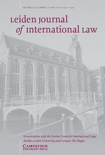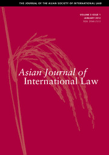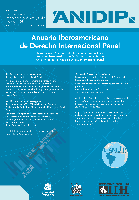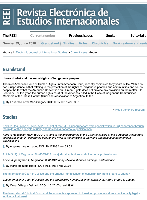
Canadian Yearbook of International Law
Scope & Guideline
Elevating Scholarly Conversations on International Law
Introduction
Aims and Scopes
- International Humanitarian Law:
The journal frequently addresses themes related to international humanitarian law, examining issues of legitimacy, state responsibilities, and the application of humanitarian principles in contemporary conflicts. - Investor-State Arbitration:
A consistent focus is placed on the dynamics of investor-state arbitration, with discussions surrounding reform, treaty implications, and the evolving landscape of international investment law. - Climate Change Law:
The journal explores the intersection of climate change and international law, discussing legal frameworks that govern environmental protection, state responsibilities, and emerging subjects of international law. - Domestic Application of International Law:
There is a notable emphasis on how international law is integrated and applied within Canadian domestic contexts, including case law analysis and the implications for domestic legal systems. - Indigenous Rights:
The journal highlights the importance of indigenous rights within international law, examining the legal frameworks that protect these rights and the implications of trade agreements on indigenous communities. - Transnational Legal Issues:
The journal addresses transnational legal issues, exploring the complexities of jurisdiction, state responsibility, and the interaction between different legal systems.
Trending and Emerging
- Transgenerational Harm in International Law:
Recent publications have begun to explore the concept of transgenerational harm, particularly in relation to trauma transmission and its implications in international criminal law, highlighting a growing interest in the long-term impacts of conflict and injustice. - Climate Change and International Legal Personality:
Emerging discussions on the legal personality of climate change entities, such as 'climate deterritorialized nations,' indicate a trend towards recognizing new subjects in international law that are shaped by environmental considerations. - International Economic Law and Reform:
There is an increasing focus on the challenges and reforms within international economic law, particularly in relation to investor-state disputes and the implications of new treaties on state sovereignty and economic governance. - Human Rights in Conflict Zones:
The journal is placing more emphasis on human rights issues within conflict zones, exploring the role of international law in protecting rights during armed conflicts and the responsibilities of state and non-state actors. - Interdisciplinary Approaches to International Law:
A trend towards interdisciplinary approaches is emerging, with scholars integrating perspectives from sociology, politics, and environmental science to enrich discussions on international law and its implications.
Declining or Waning
- Traditional Treaties and Agreements:
There has been a noticeable decrease in publications focusing solely on traditional treaties and agreements, with more emphasis being placed on their practical implications and the dynamics of contemporary legal challenges. - Historical Legal Analysis:
Papers that focus on purely historical analyses of international law are becoming less frequent, as contemporary issues and their legal ramifications take precedence. - Static Legal Doctrines:
The exploration of static legal doctrines without consideration of their application in modern contexts is waning, as scholars increasingly seek to connect theoretical frameworks with real-world implications.
Similar Journals

Leiden Journal of International Law
Elevating scholarly conversations on global issues.Leiden Journal of International Law, published by Cambridge University Press, stands as a leading platform for scholarly discourse in the fields of international law and political science. With its ISSN 0922-1565 and E-ISSN 1478-9698, the journal has established a significant academic presence since its inception in 1988, upholding rigorous standards through a robust peer-review process. The journal is notable for its impressive impact factor, categorizing it in the Q1 quartile for law and Q2 for political science and international relations, indicating its widespread influence and recognition among scholars. As a vital resource for researchers and practitioners, the journal contributes to the advancement of legal scholarship and promotes critical discussions surrounding contemporary international issues. Although it operates under a traditional subscription model, its comprehensive analyses and critical insights make it an essential read for those engaged in the interdisciplinary examination of law and global governance. The journal is headquartered in Cambridge, England, and continues to play a pivotal role in shaping the discussions that define the contemporary landscape of international law.

Asian Journal of International Law
Elevating Scholarly Debate in International LawThe Asian Journal of International Law, published by Cambridge University Press, is a premier academic journal dedicated to advancing the discourse on international law across Asia and beyond. With its ISSN 2044-2513 and E-ISSN 2044-2521, the journal has carved a significant niche in the field, achieving a Scopus rank of #463 out of 1025 in the Social Sciences category, placing it in the 54th percentile. As of 2023, it holds a Q3 category in law, reflecting its growing influence and recognition within the academic community. The journal features peer-reviewed articles that critically engage with contemporary legal issues, promote scholarly debate, and provide insights into the legal frameworks affecting the Asia-Pacific region. With no open access options currently available, it caters primarily to academics, professionals, and students seeking in-depth knowledge and critical analysis. The Asian Journal of International Law aims to be at the forefront of international legal scholarship, fostering an understanding of the complex legal landscapes that shape our world.

Rabels Zeitschrift fur Auslandisches und Internationales Privatrecht
Connecting scholars and practitioners in private law.Rabels Zeitschrift für Auslandisches und Internationales Privatrecht, published by MOHR SIEBECK, is a premier academic journal dedicated to the field of international and foreign private law. With its esteemed ISSN 0033-7250 and E-ISSN 1868-7059, this journal serves as a vital resource for scholars, practitioners, and students interested in the complexities of cross-border legal issues, comparative law, and the evolution of international legal standards. As a significant contributor to the discourse on private law, the journal facilitates a platform for comprehensive analysis and critical review, ensuring that contemporary legal challenges are addressed through informed scholarly engagement. Although it currently operates under a subscription model, its impact is underscored by its commitment to fostering academic dialogue and advancing legal scholarship. Located in Tübingen, Germany, this journal remains at the forefront of legal research, providing insightful and rigorous contributions to the field.

Anuario Iberoamericano de Derecho Internacional Penal
Enhancing understanding of international law principles.Anuario Iberoamericano de Derecho Internacional Penal is a distinguished open-access journal dedicated to the field of international criminal law, published by UNIV ROSARIO, EDITORIAL. Since its inception in 2013, this journal has provided a platform for rigorous research and scholarly discussions related to the complexities of international penal law, enhancing understanding and application across Ibero-American jurisdictions. With an ISSN of 2346-3120, it caters to an audience of researchers, legal practitioners, and students who are keen to explore contemporary issues, case law, and reforms within the realm of international criminal justice. The journal aims to foster interdisciplinary dialogue, promote legal scholarship, and contribute to the development of international law principles in the Spanish-speaking world. As an essential resource for those engaged in the study and practice of international law, Anuario Iberoamericano de Derecho Internacional Penal continues to uphold a commitment to accessibility and academic excellence.

Revista Electronica de Estudios Internacionales
Bridging Theories and Practices in International RelationsRevista Electronica de Estudios Internacionales is a prominent academic journal dedicated to the exploration of international studies, published by the esteemed ASOC ESPANOLA PROFESORES DERECHO INT & RELACIONES INT-AEPDIRI. Based in Spain, this journal has embraced an Open Access model since its inception in 2000, allowing researchers, students, and professionals to freely access and disseminate significant findings in the field. With an ISSN of 1697-5197, the journal highlights critical issues surrounding international law and relations, maintaining a vital role in the ongoing discourse within the academic community. Currently categorized as Q4 in the Law field and ranked #755 out of 1025 within the Scopus database, the journal offers a platform for innovative thinking and scholarly contributions, which are particularly important in today's rapidly evolving global scenario. Explore the latest research and insights from 2019 to 2023 in this essential resource for those engaged in the study and practice of international relations.

Law & Practice of International Courts and Tribunals
Advancing Scholarship in International LawLaw & Practice of International Courts and Tribunals is a prestigious academic journal published by BRILL, focusing on the interplay between international law and the functioning of international courts and tribunals. Since its inception in 2007, the journal has established itself as a crucial platform for scholarly discourse, achieving a Q1 ranking in Law and notable placements in categories such as Political Science and Sociology. With a commitment to advancing knowledge, it serves researchers, practitioners, and students alike, facilitating a deeper understanding of the legal frameworks that govern international adjudication. Despite its non-open access model, the journal's content is highly regarded for its rigorous peer-reviewed articles, which lend critical insights into evolving legal practices and cultural dialogues within the international legal community.

German Law Journal
Fostering Dialogue Across Legal FrontiersGerman Law Journal, published by Cambridge University Press, stands as a leading open-access platform for scholarly discourse in the field of law, having made its content freely available since 2019. With an impressive impact factor that places it in the Q1 category for Law as of 2023, and a robust Scopus ranking of #164 out of 1025 in the social sciences category, this journal is recognized for its high-quality research and significant contributions to legal scholarship. The journal encompasses a wide array of topics pertinent to the German legal system, European Union law, and comparative legal studies, thus catering to researchers, legal practitioners, and students alike. Located in the heart of the UK, at Edinburgh Building, Shaftesbury Rd, Cambridge, this journal not only fosters academic engagement but also promotes interdisciplinary dialogues that enrich the understanding of legal principles in an evolving global context. Emphasizing accessibility and high academic standards, the German Law Journal serves as an essential resource for those seeking to explore and contribute to contemporary legal discussions.

COLUMBIA JOURNAL OF TRANSNATIONAL LAW
Advancing Scholarship in Transnational Legal Studies.The COLUMBIA JOURNAL OF TRANSNATIONAL LAW, published by the COLUMBIA JOURNAL TRANSNATIONAL LAW ASSOCIATION, stands as a premier academic platform in the fields of Law, Political Science, and International Relations. Having maintained a commendable Q2 ranking in both law and political science categories for 2023, it represents a vital resource for scholars and practitioners alike in navigating the complexities of transnational legal issues from 1996 to 2024. Situated in the U.S. at the esteemed Columbia University School of Law, the journal not only meets the rigorous academic standards but also addresses pressing global challenges through interdisciplinary research. Although it does not currently offer open access options, its commitment to providing insightful analyses and fostering robust scholarly dialogue in a rapidly changing world remains paramount. With its inclusion in reputable databases like Scopus, the journal is poised to impact the academic landscape significantly, catering to both emerging and established voices in transnational law.

UNIVERSITY OF TORONTO LAW JOURNAL
Illuminating the Path of Legal InnovationUNIVERSITY OF TORONTO LAW JOURNAL, published by University of Toronto Press Inc, stands as a distinguished platform in the realm of legal scholarship, having served the academic community since its inception. With an ISSN of 0042-0220 and an E-ISSN of 1710-1174, this quarterly journal is not only recognized for its rigorous peer-review process but also boasts an impressive Q2 rank in Law and a Q3 rank in Sociology and Political Science as per the 2023 category quartiles. The journal aims to foster advanced knowledge and discourse on various legal issues, thereby appealing to researchers, professionals, and students alike who are eager to engage with contemporary legal debates. It is noteworthy that the journal currently does not offer open access, ensuring the integrity and quality of its publications for a subscribed audience. Published in Canada and available for a wide readership, the UNIVERSITY OF TORONTO LAW JOURNAL continues to be a pivotal source for critical analyses and fresh insights in the fields of law and social sciences, contributing significantly to the understanding and evolution of legal frameworks.

University of Bologna Law Review
Elevating Legal Discourse Through Open AccessUniversity of Bologna Law Review, published by UNIV STUDI BOLOGNA, ALMADL JOURNALS, serves as a pivotal platform for legal scholars and practitioners in the field of law. Established as an Open Access journal in 2016, it has committed itself to disseminating high-quality research and fostering vibrant discussions around contemporary legal issues. Based in Italy, the journal addresses a broad spectrum of topics within the realm of law, enhancing its reach and applicability. Although it currently holds a Q4 ranking in the 2023 law category according to Scopus, this reflects its potential for growth and contribution to academic discourse. The journal’s h-index and precise scope will be developed as it continues to publish groundbreaking research up to 2024. With an aim to cultivate educational resources and foster innovative legal thought, the University of Bologna Law Review is an essential resource for researchers, professionals, and students alike, harnessing the power of open access to engage a global audience.